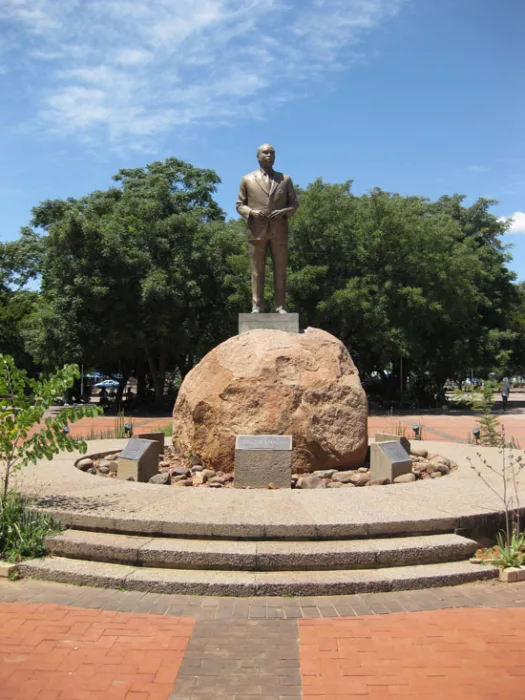Seretse Khama: The Visionary Leader Behind Botswana’s Remarkable Economic Transformation.
Seretse Khama, born on July 1, 1921, in Serowe, Botswana, was a visionary leader whose impact on his country’s history is immense. Despite facing personal and political adversity, including a controversial interracial marriage to Ruth Williams and forced exile by the British government, Khama became a pivotal figure in Botswana’s struggle for independence. As the country’s first president, he spearheaded a remarkable “economic miracle,” skillfully managing natural resources, particularly diamonds, and implementing policies of good governance and development. Under his leadership, Botswana transformed from one of the poorest nations in the world to a middle-income country, known for its political stability and sustainable economic growth. His legacy endures in modern, prosperous Botswana.

Struggle for Independence and Leadership
At the age of four, following his father’s death, he inherited the title of kgosi (paramount chief) of his people. He received his initial education in South Africa and later studied Law at the University of Oxford, United Kingdom. During his stay in London, he met and married Ruth Williams in 1948, an interracial union that caused controversy both in his homeland and in the British metropolis. This marriage resulted in his forced exile, being deprived of his right to return to Bechuanaland and forced to renounce his tribal leadership. After years of political struggle and negotiations, he was finally allowed to return to his country in 1956, although he had to formally renounce his tribal title.

Seretse Khama founded the Botswana Democratic Party (BDP) in 1962 and led his country to independence in 1966. As Botswana’s first president, Khama implemented policies focused on political stability, transparency, and good governance. His leadership laid the foundation for the country’s remarkable economic growth.
The Economic Miracle of Botswana
The discovery of diamonds in 1967, shortly after independence, was a turning point. Khama skillfully negotiated with De Beers to ensure that diamond revenues benefited the country directly. These revenues were reinvested in infrastructure, education, and health, transforming Botswana into a diversified and prosperous economy. During the 1970s and 1980s, Botswana experienced one of the highest economic growth rates in the world, with an annual average exceeding 10%.
Education and Human Development
Khama prioritized education as a driver of development. Schools were built and educational programs were implemented to increase literacy and technical skills, laying the groundwork for long-term sustainable development.
Enduring Legacy
The legacy of Seretse Khama is evident in modern Botswana, a nation known for its stability, good governance, and economic growth. His vision and leadership transformed Botswana from one of the poorest countries in the world to a middle-income nation. Khama passed away on July 13, 1980, but his impact remains a source of inspiration for his country and the world.
Seretse Khama, the first president of Botswana, left an indelible mark on his nation’s history, transforming it from an impoverished country into one of Africa’s most remarkable success stories. His achievements span multiple areas:
- Politics:
- Established a stable, multiracial democracy in 1966, at a time when many African countries were falling into dictatorships.
- Maintained diplomatic neutrality during the Cold War, avoiding regional conflicts.
- Economy:
- Implemented prudent economic policies that led to sustained economic growth.
- Negotiated favorable agreements for diamond exploitation, turning this resource into an engine of national development1.
- Diversified the economy beyond cattle farming, boosting sectors such as mining and tourism.
- Education:
- Prioritized investment in education, significantly increasing literacy rates.
- Established the University of Botswana, training local professionals.
- Human Rights:
- Promoted a non-racial and tolerant society, in contrast to apartheid in neighboring countries.
- Enshrined fundamental rights in Botswana’s constitution.
- Defended the right to self-determination of African peoples.
- Social Development:
Seretse Khama not only brought political independence to Botswana but also ushered in an era of economic development and social progress that continues to benefit his people. His life and presidency are a testament to how visionary leadership can transform a nation.